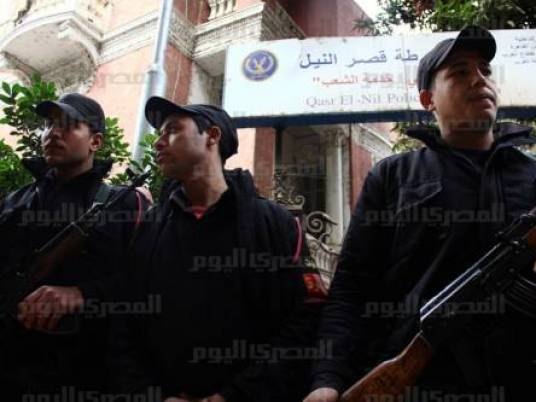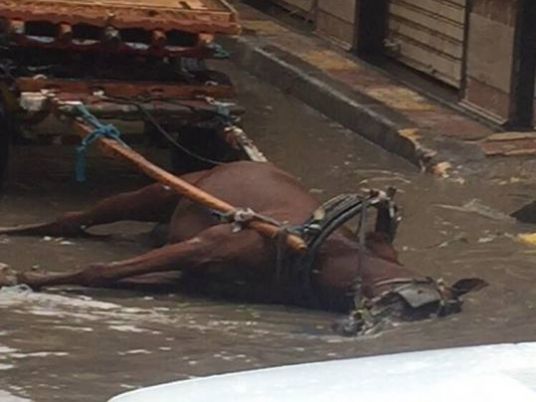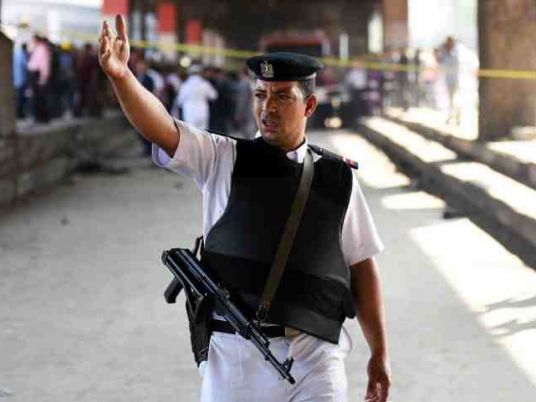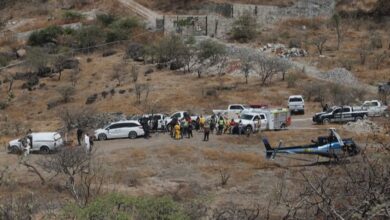
A new draft law on private security companies currently on the table is an attempt to regulate a sector that for more than 30 years has operated with almost no oversight.
This past week, students at Misr International University, who were engaged in a sit-in to demand increased safety measures on the highway and a road leading to campus, were attacked with excessive force by the university’s private security.
Police refused to intervene in the clashes, highlighting a troubling security dynamic in Egypt’s post-uprising streets.
Under former President Hosni Mubarak, crime was contained by an Interior Ministry that worked at the behest of the regime and had few scruples about the heavy-handed methods it employed to contain any activity deemed antagonistic to its interests. As a result, major crime in touristic and upper-class areas was rare.
After the revolution, and in the vacuum left by an unraveling Interior Ministry, whose authority on the streets has evaporated, Egyptian citizens and the state have to adjust to a new reality of increased crime rates.
A monopoly on force is, according to some thinkers, the defining feature of the state, but in the country’s increasing chaos, Egyptians are relying even less on the police for direct security than they did before the revolution. Private security actors — either in the form of trained guards or hired muscle — are increasingly filling this vacuum.
Some have called this the privatization of police functions, but Caroline Holmqvist argues in the report “Private Security Companies: The Case for Regulation” that the privatization of security in weak or failing states is “essentially a misnomer, since consumers have turned to the private sector because of the lack of functioning public sector security institutions. Indeed in many cases there was little to privatize.”
Estimates about the number of Egyptian private security firms in existence vary wildly; private security companies register as commercial entities. Many of them provide other services as well, such as cleaning, while some of them exist only on paper or are fronts for shady operations.
Private security firms Egypt Independent spoke to insist the vast majority of companies employ men with little or no training — what Securitas Managing Director Ahmed Emam describes as “warm uniforms.”
Care Services was the first private security firm to be established in Egypt, in 1979, and now employs nearly 5,000 security personnel.
In the Care Services Cairo offices, a group of men attended a final lecture on fire safety procedures before the graduation ceremony the next day. Behind them were human outlines used as target practices for when the room is converted to a shooting range.
Care Services Security Division Manager General Abdel Rahman Bahgat lamented the appearance of companies that provide no training to its employees; Care Services and other companies have been campaigning for the sort of regulation contained in the draft law “for 20 years.”
Ihab Youssef, a former police officer who now heads the risk management and security group Risk Free, identifies three main problem areas in the private security sector: an absence of a government master plan, no oversight of security guards and their qualifications, and, finally, no benefits, such as social and life insurance.
As a result, Youssef says, security guards have “no sense of loyalty to the job.”
“In Egypt, people who can’t find work elsewhere work in private security companies. It might not be the best job in the world, but there needs to be career development,” Youssef says.
Emam of Securitas believes throwing guards at a potential security risk is not the correct approach: “People are not spending money in the right way.”
The former telecommunications engineer was a founder of the Egyptian branch of multinational security company G4S. He left the company because the its vision of selling more guards did not accord with his own vision of integrated solutions — technology, “the dream” which motivated him to join the sector in the first place.
Emam gives the example of secure money transportation. In some countries, vans that can be controlled remotely are used to transport cash. If stolen, the vehicle is tracked, shut down and locked.
The only problem with using this kind of technology in Egypt, Emam says, is that tracking is illegal and the sole jurisdiction of the Armed Forces.
It is this combination of incredibly restrictive and nonexistent legislation that makes the sector so chaotic. Youssef describes it as “working in a haphazard way. Anyone does anything he wants.”
The only law regulating the sector specifically was passed in 1970 and concerns individuals employed to guard buildings versus security firms. It makes a three-year renewable license for security guards issued by the head of security in the relevant governorate mandatory, though this is routinely ignored in practice.
Notably, the law describes a security guard as anyone designated to protect a building, a definition applicable to the doormen stationed in residential and commercial buildings everywhere in Egypt — none of whom are licensed.
The stipulation that security guards work only on private premises is also routinely ignored through the use of “VIP bodyguards” — bodybuilder escorts used either for prestige or because they are regarded as a threat deterrent.
While other legislation governs the licensing and use of aspects of private security work such as weapons and telecommunications, it says nothing about training or accountability of private security guards, some of whom are licensed to carry weapons.
The draft law currently before the Shura Council addresses training but is silent about accountability.
It states security guards must be over 21, literate, have done or been exempted from military service, and be sufficiently fit to do the job.
Like the 1970 law, the draft makes licenses mandatory, but for companies themselves as well as guards. The former are required to pay LE100,000 to the Interior Ministry for a license to operate for three years while guards pay LE200 for a license of the same duration.
The law stipulates that security guards must pass a training course in the area they propose to work in, but leaves the specifics of this to the implementing statute.
Crucially, and for the first time, the law provides for government oversight of licensed private security companies’ activities. Security firms would be subject to inspections of their working areas, as well as company offices and vehicles, to ensure they would be operating in accordance with the as yet unissued draft law.
According to the adage, security breeds security: People see their neighbors taking security measures and think they should be doing the same. Care Services’ Operations Manager Mohamed Eissa says business has increased by 10 percent after the revolution, a trend confirmed by other security companies Egypt Independent spoke to.
Egypt may well be heading the way of South Africa, where there are 2 million people employed in private security firms — more than are employed in the police force — performing policing functions.
In “Policing for Profit: The Future of South Africa’s Private Security Industry,” Jenny Irish lists the reasons for the expansion of the sector: the growth of public-private property such as shopping malls and the perception that the police are unable to protect the public — both relevant to the Egyptian context.
Notably, Irish writes, “Private security shifts the responsibility for social control and order away from the state.”
“The expansion of private security involvement, such as patrolling the neighborhoods of those who can afford it, has the effect of creating ‘enclaves,’” she writes. “There may be a reduction in crime in an enclave, but this does not lead to an overall reduction in crime.”




